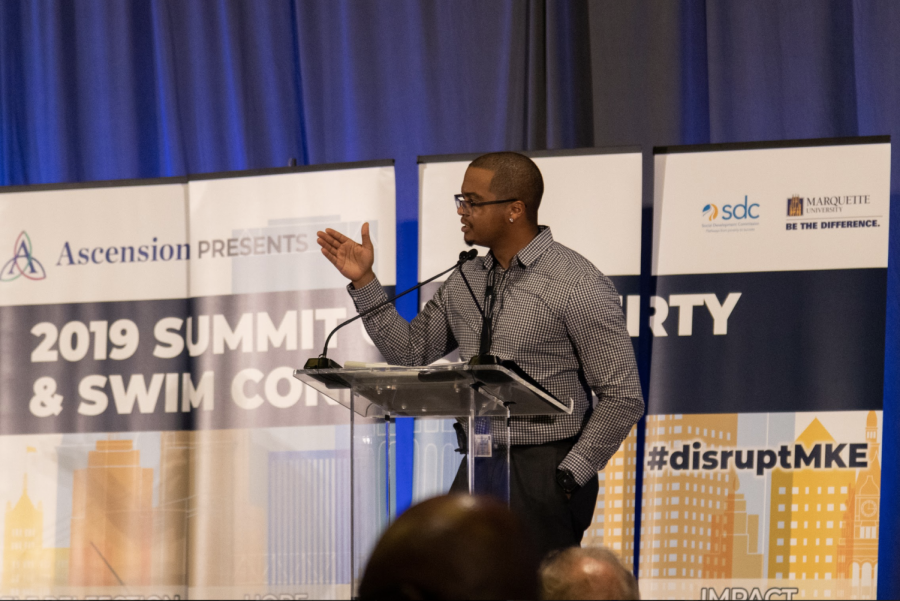University President Michael Lovell’s initiative Scaling Wellness in Milwaukee, or SWIM, teamed up with the Social Development Commission for the Summit on Poverty Oct. 7-8 at the Wisconsin Center to examine the methods local organizations use to help Milwaukee heal from trauma.
SWIM is an initiative that aims to eliminate trauma through collaboration and community in the Milwaukee area.
In past years, each group hosted its own conference. This year, Lovell approached the SDC with the hope of collaboration. The Summit was an opportunity for self-reflection of the various efforts to improve Milwaukee. The themes were self-reflection, hope and collective impact, according to the Summit website.
The Summit aimed to bring together institutions throughout Milwaukee to create a network of resources to best tackle poverty in the city.
According to the website, “The 2019 Summit and SWIM Conference targets community leaders, human service professionals, educators, advocates, board members and people experiencing poverty in Wisconsin.”
“We are not able to do everything,” Al Smith, president of the Social Development Foundation, said. “But we can assess where people are and the help they need.”
SWIM is made up of eight action teams, including Research and Best Practices, Corporate Engagement and Policy. Each one is responsible for approaching the initiative from a unique perspective.
Similarly, the joint conference brought together many organizations to engage in self-reflection and open channels of communication.
Abra Fortson, executive support manager with the SDC, said Lovell’s proposed partnership for the Summit was a natural fit. She said the Summit brought together many perspectives on the experience of poverty, both from those who have lived it and from service providers.
The organizations at the conference, including the All of Us Research Program, the SDF and YWCA, offer a variety of services aimed at fighting Milwaukee’s poverty. For example, the SDF offers GED and employment readiness courses, free tax services and on-the-job training opportunities.
Many of these groups, however, struggle to fund all of their initiatives. Part of the Summit’s self-reflection involved examining funding and resource allocation through a lens of collaboration.
Rev. William Barber, one of the conference keynote speakers, said the poor have been “crucified by the system.”
“We must lead with the poor — not just on their behalf,” Barber said.
He delivered his words like a sermon with many in the ballroom clapping and vocally assenting as he spoke.
“Every nation will be judged by questions,” Barber said. “When I was hungry, did you feed me? When I was sick, did you give me health care?”
The All of Us Research Program aims to amass more medical information about minorities. Over 90% of the samples of data is middle-aged, European white males, said Mirtha Sosa Pacheco, a community coordinator.
Programs such as this one attempt to bridge these gaps to offer minorities equal support. The concept of building connections and creating equality are central to both the SDC and SWIM. The summit emphasized a questioning attitude, with people often asking “how can we change this?”
Fortson said Milwaukee’s struggle to rise out of poverty is rooted in “isms” such as racism and sexism. Knowing these barriers exist is the first step towards breaking them down, Fortson said.
However, Fortson said it can be easy to gloss over these challenges because of discomfort.
“We need to examine privilege not from a lens of defense,” Fortson said. “We can authentically research white privilege not as an attack, but to show disparities exist, such as in policies or systems that are harder to navigate.”
Fortson said the best thing people in a position of privilege can do is to challenge their own privilege and be comfortable with discomfort.
Ascension SE Wisconsin Hospital is hosting a SWIM policy workshop Oct. 30 from 1-4:30 p.m. According to the SWIM website, the workshop “aims to enhance the knowledge, confidence and activation of SWIM members to participate in effective policy advocacy (not lobbying) with local and state government administrators and legislators to benefit vulnerable populations and to advance equity.”


